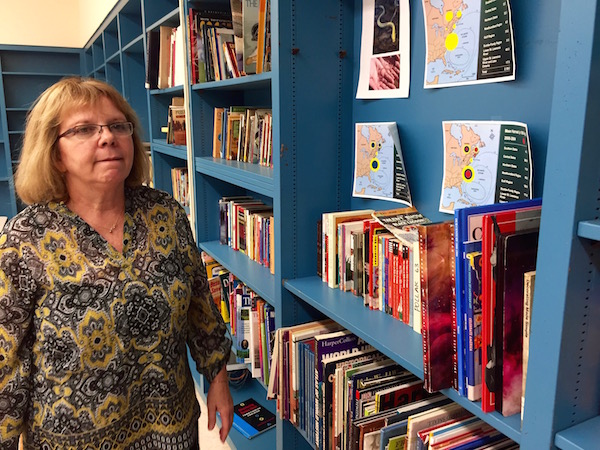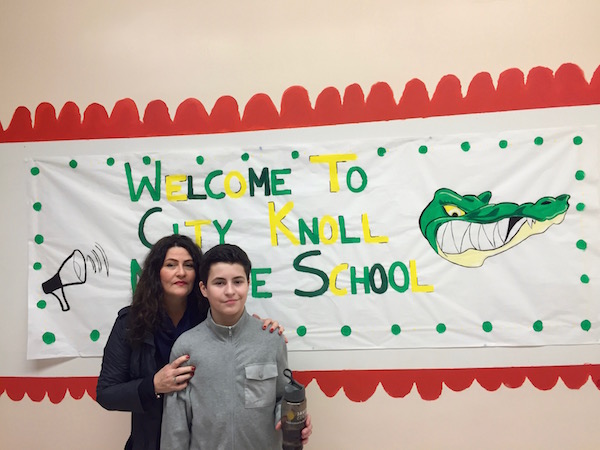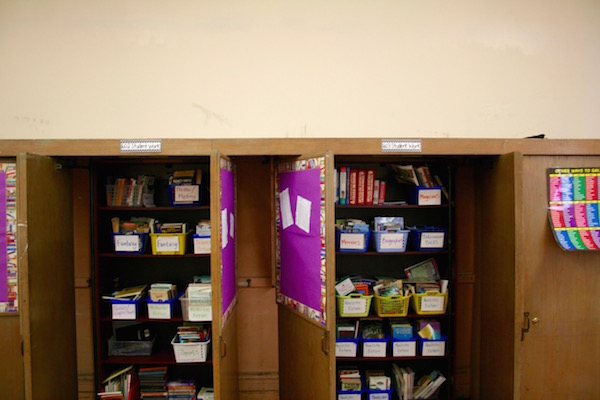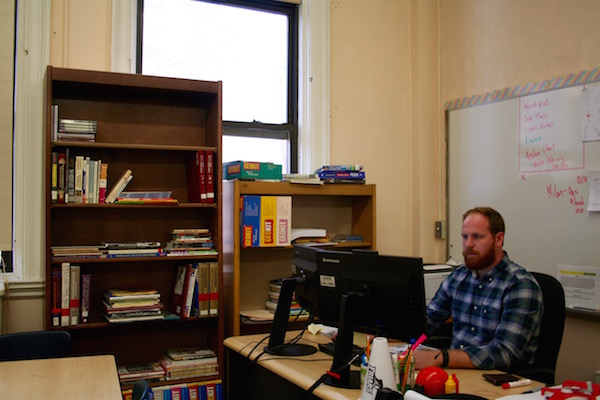
BY YANNIC RACK | A school between Chelsea and Hell’s Kitchen is using every trick in the book to provide its students with a library.
The City Knoll middle school (on W. 33rd St. btw. 10th & 11th Aves.) has only been around for two years — but instead of having a room full of books, its 150 kids largely have to rely on a small stack of outdated and yellowed paperbacks.
“All the books that are on the shelves are books that were left behind by the school that was here before,” said Victoria Armas, the school’s principal, on a recent tour of their second-floor library space — a row of mostly empty shelves lining a conference room.
“We had been delighted to find all these books, thinking maybe we can use some of them, but [someone from library services] came in and said paperback books are not good for a library,” she said. “It was very disheartening.”
Since the boxes of discarded literature turned out to be mostly useless, the principal, teachers and parents at the school have started to get creative.
As the vice president of City Knoll’s PTA board, Susan Treacy-Mannix recently attended a neighborhood assembly for the Participatory Budgeting process — an initiative that gives residents a say over how a portion of the city’s capital funds are used in their council district. Treacy-Mannix, who lives at Manhattan Plaza on W. 43rd St., and whose son Patrick attends seventh grade at the school, was there to advocate for the library.

“We need it, we need it for these kids,” she said. “Downtown had everything, then they got hit by Sandy and got it again. We never had anything to begin with [in Hell’s Kitchen], and this goes back a long time. That’s why I want this library.”
Before moving to a new address this summer, the school spent its first year in the building of PS 51 (on W. 44th St.) for what’s called an incubation period.
“We had access to their library, so it was kind of this little grey area,” said Julie Taegel, who teaches math and English as a second language at City Knoll.
Although Armas emphasizes that they will always be a small school, City Knoll is still growing fast. It started out with three classes of sixth graders in September of last year, but they have now moved up to the seventh grade and been replaced by a new incoming class. Next year, the ascending eighth graders will bring the school to full capacity.
Since there is a library space set aside but not enough books to fill it, the students now rely on classroom libraries — which usually consist of a few textbooks as well as a small collection of fiction and non-fiction.
Most of those are either bought from a small amount set aside for books (contained in the school budget), or consist of leftovers from the previous schools that occupied the building — first St. Michael Academy, a private, all-girls Catholic high school, and later the Clinton School of Artists and Writers, which expanded and moved to a new home on Union Square earlier this year.
Although New York State law requires schools to have a library as well as a librarian, there are no fines for those that don’t comply.
“There’s no money that comes along with that requirement,” Armas noted, adding that she wants to hire a librarian but has maxed out her budget. “I think because there are no sanctions, schools get away with not having libraries. But it’s something I believe in, and we should have one.”

Apart from a fixed funding allocation, schools in the city receive a tax levy (paid per student on the register), with additional money for students with special needs and English language learners.
In its first year, City Knoll also received Title I funding, which is available to schools with high percentages of children from low-income families. But this year, they narrowly missed the target to qualify again.
“We missed by .5 percent, which was very upsetting,” said Armas. “We’ll see if we qualify for next year, but that was a huge loss for us [in terms of funding]. It’s tens of thousands of dollars.”
Taegel thinks the school especially needs a library because many of its students come from lower-income households — City Knoll is one of only three schools out of the district’s 17 that don’t screen applicants on the basis of interviews or test scores.
“We kind of have open enrollment,” Taegel said. “It’s a fact that literacy rates are directly tied to access to books. So if kids are coming from a home that doesn’t have a lot of books, or highly literate parents, they’re already starting way behind.”
Taegel has volunteered to become a delegate for the Participatory Budgeting process, which this year will award around $1 million to capital projects across Council District 3.

Under the program, residents put together a list of viable projects that could receive funding and, after a lengthy review process, vote on a final ballot to pick their top five in April.
Last year’s winners included a new park on W. 20th St. and a range of renovations for the New York City Lab School for Collaborative Studies (on W. 17th St.) and PS 3 (on Hudson St.).
But even if a library for City Knoll is funded, it could take years until it actually materializes. Out of the projects selected during last year’s inaugural Participatory Budgeting process, none have broken ground so far.
So in the meantime, City Knoll is looking for funding sources elsewhere.
Last year, one of the new teachers joined from a school that was being phased out — so its principal bequeathed some materials to City Knoll. “We took everything they’d give us, and so that helped a great deal,” Armas said. “We got a lot of art books, so our art classroom has some books now.”
A literacy coach also comes in twice a month to bring the kids up to grade level by the time they leave for high school. This is funded by Middle School Quality Initiative, an effort by the city’s Department of Education that also provides City Knoll with an iPad app that gives access to digital reading materials.
The school purchased 20 iPads last year, which are used by classes on a regular basis and wheeled around in two “tech carts.” Armas is planning to expand the collection with laptops and printers, which will be bought with a grant the school recently won from Manhattan Borough President Gale Brewer’s office.
Although the money is a big help, it is limited to technology, and can’t be used for buying more books, or to hire a librarian.
“We continue to explore how we can do that,” Armas said. “We’ve also been hitting up the construction companies, because this area is booming.” Just a short walk down the street from the school, the $20 billion Hudson Yards project is underway, and countless other developments have sprung up in the area in recent years.
“We deal with all the pounding of the foundations. The PTA will talk to them and ask if they can donate something,” Armas said, adding that a library has benefits aside from storing books.
“There’s a whole aura about a library that is scholarly,” she notes. “I think it goes along with the whole package. I’ve been an educator for more than thirty years, and reading opens doors.
“We have a lot of kids that don’t have a computer at home. Imagine if you have to research something and don’t have access to a computer. At least you can come to the library and take a few books home.”
For parents like Treacy-Mannix, whose son will start his final grade at City Knoll next year, the point of a proper library is even more straightforward.
“If we can do this, these kids have a better shot at getting into good high schools,” she said.
































